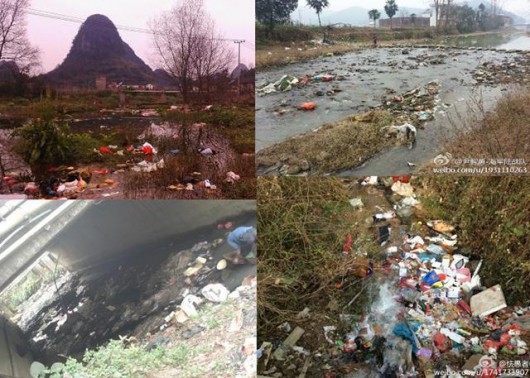
Zhejiang province recently started a campaign that would require government officials to swim in its polluted rivers.
In a video conference held on June 26, Zhejiang People’s Congress deputy director said, “Mass awareness of water pollution should not be understood by data, but by drinking and swimming in the water (and) the leading officials should do this test.”
Leaders testing the quality of water is a longstanding and symbolic tradition in China, but this campaign is probably an allusion to entrepreneur Jin Zengmin’s post on Sina Weibo that contained photographs of a very polluted river in Ruian, Zhejiang and a an offer of 200,000 RMB for any local official that would swim in it for twenty minutes. Bureau chief Bao Zhenming refused the offer according South China Morning Post, blaming the pollution on overpopulation instead of factories in the region.
The response has been polarizing. Those against the campaign have voiced their opinions through microblogging sites and editorials.
Wangshu Wei voiced his disapproval in Dongbei Xinxi stating, “The National Environmental Protection Act and its related regulations on environmental pollution have clearly defined, quantitative indicators of environmental pollution data requirements. The river pollution control standards should be based on monitoring data to determine the environmental protection department, and not based on conclusions from leadership testing the water.” He went on to say that sufficient legislation exists, but those “cadres” that fail to execute regulations should bear the cost.
Those in favor are dissatisfied with the government’s efforts in following through with newest action plan to curb pollution. Party official Pan Yuejie was quoted in the Global Times assuring citizens that if violations happened, they would find out in no time due to 24 hour surveillance systems. In February, 715 allegations brought forth by government agencies were all proven false.
Whether you agree with holding officials physically responsible or not, the numbers still stand.
- 80% of the East China Sea that surrounds Zhejiang is polluted by uninterrupted industrial dumping.
- The water quality along its coastline was worse than the worst grade on a four-scale system.
- Xiangshan Port exceeded standards by 41%
- Yueqing Bay exceeded standards by 50%
- 66.7% of the shellfish were contaminated by heavy-metals, including pretroleum, DDT, and arsenic
Zhejiang’s economy relies on agriculture and aquaculture. It has been reported that its fisherman won’t eat shellfish, and some farmers won’t even eat their yield.
Water pollution, not just air pollution, needs to be addressed earnestly somehow, even if the province’s new campaign sinks or swims.

















































Not sure that those pictures depict polluted water so much it does wet garbage.
It’s so common now that it’s an accepted part of Chinese landscape photography…
and painting!
http://i.dailymail.co.uk/i/pix/2013/03/24/article-2298403-18E1AFE8000005DC-446_634x597.jpg
http://i.dailymail.co.uk/i/pix/2013/03/24/article-2298403-18E1B0F9000005DC-173_634x286.jpg
http://www.takepart.com/sites/default/files/styles/tp_gallery_slide/public/Yao%20lu_0.jpg?itok=uuII6bzt
It was inevitable…